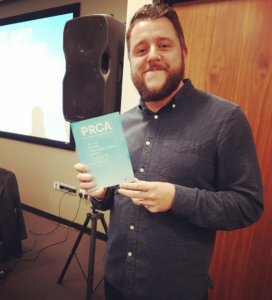PRCA’s fifth annual Digital PR and Communications Report

This week we attended the fifth annual PRCA Digital PR and Communications report, where Brazen’s very own Head of Social, Lee Benecke, was on the panel of experts.
362 agency and in-house PR professionals were surveyed across a variety of disciplines in order to get the results.
The report had some noteworthy findings but we’ve pulled our top five findings.
In-house budgets
There’s a battle brewing in-house between which department creates the content as both PR and social in-house departments say they have reduced their content creation by 20% and 10% respectively, but the marketing department is creating 10% more. This is potentially due to the wider awareness of the benefit of content creation across all marketing areas and the need for a centralised plan.
Encouragingly, brands are continuing to invest their budgets in social media and digital, with 27% of spend going to social up from 25% in 2016.
However, despite the recent growth there has been a budgets cut in using agencies for some service areas. These include community management, monitoring, web development build and training.
Content creation
This year has seen a rise in agencies usage as content-creators with video based content increasing from 10% up to 13%.
Image-based content is also on the rise with the purchasing of this up to 11% showing a 6% growth. Also, text-based content is 11% up from 7% suggesting that agencies’ creativity is required to keep content fresh. We launched Brazen Live earlier this year to make sure we help deliver fresh content regularly for our clients.
Client expectations
56% of in-house contacts say they expect PR to agencies deliver influencer outreach services.
Both our PR and social teams work with influencers and have gained lots of experience and contacts from this. It will be interesting to see whether one team will take full ownership of this in the future or whether it will continue to straddle the two.
Fear of attack
Due to high profile coverage of trolls attacking celebs and cases of bullying online, it could put off anyone giving an opinion out there on social media. This is also true for brands according to the report as the reason for brands to back away from social for fear of attack is up to 12% from 3% – the highest figure since the research began.
Platforms
We’ve already seen platforms which were once new and exciting fade out and soon forgotten about, but which will be the next to go? Snapchat seems to be the best way to reach out to millennials, however brands have always struggled with this platform and it’s seen a 6% decrease this year.
In an industry that is constantly growing and changing, it’s interesting to see which platforms and types of content clients are investing in to keep ahead of the game. However, with platforms continuously evolving, new ones being thrown into the mix and some never to be used again, the real future of social probably hasn’t even been invented yet.
Want to know more? Contact us here for more information

